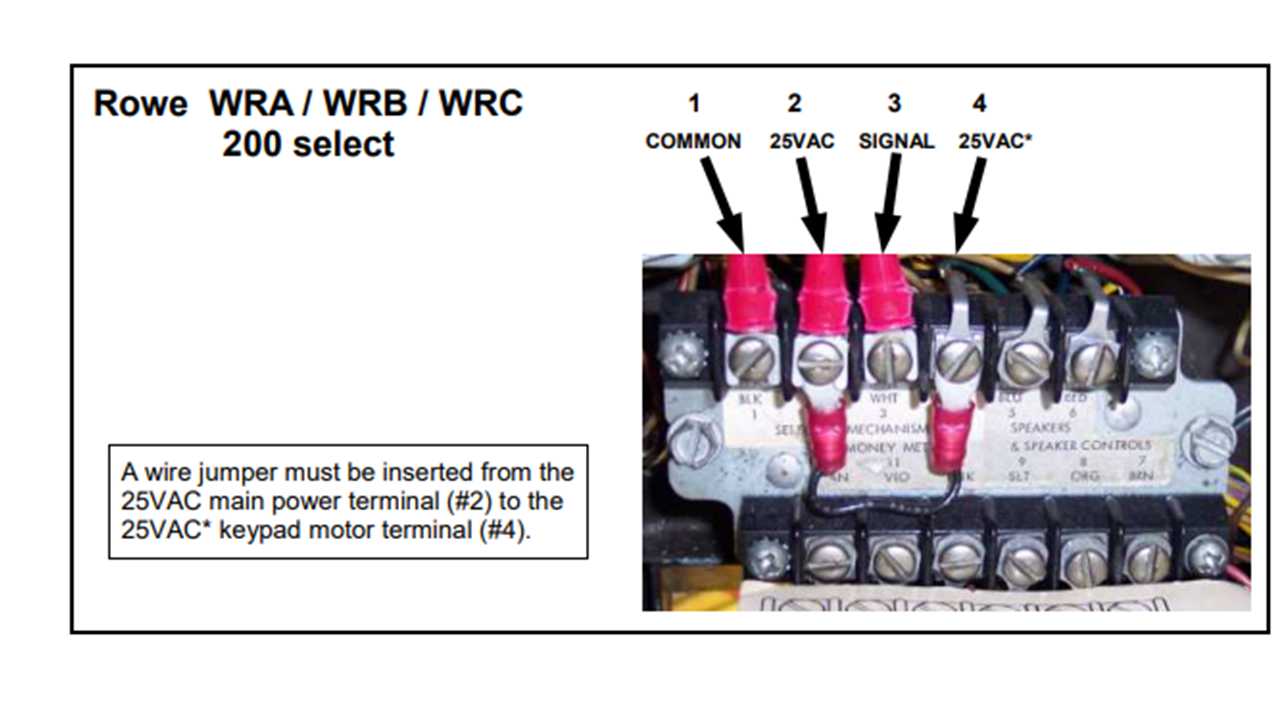Forum Replies Created
-
AuthorPosts
-
Randy
ParticipantThat is certainly stripped! Wonder what caused that much distortion – I have not encountered anything that severe yet.
Randy
ParticipantWell. I have had decent luck on tempered glass with a pumice based hand cleaner or jeweler’s rouge/mild polishing compound and a handheld rotary tool. Not sure if the SC glass is tempered, I can’t find a place around here that will cut tempered that small. I would practice on a bit of scrap glass before doing the box though.
Randy
Randy
ParticipantSorry dimi, the WB2MP3 won’t work on the solid state WRF. Check your post on the other forum you posted on.
Randy
Randy
ParticipantGreat! Glad it is all good to go. The folks at WB2MP3 have always been really helpful for me too.
Randy
Randy
ParticipantNice booth setup Michael, good to see another wallbox up and making music whether connected to a juke or not.
Randy
Randy
ParticipantHey Andrea, I am not an electrical engineer but if you are and are familiar with how to utilize an oscilloscope you may be able to interpret the signal a W4-L56 pulse generator produces and then convert that 117/220v signal to the 24v pulse input a WB2MP3 needs.. Here is a pretty good explanation of the 24v pulse cycle with oscilloscope readings: https://hecgeek.blogspot.com/2017/10/wall-o-matic-interface-3.html
Ehi Andrea, non sono un ingegnere elettrico, ma se hai familiarità con come utilizzare un oscilloscopio potresti essere in grado di interpretare il segnale prodotto da un generatore di impulsi W4-L56 e quindi convertire quel segnale 117 / 220v nell’ingresso a impulsi 24v un WB2MP3 ha bisogno .. Ecco una spiegazione abbastanza buona del ciclo di impulsi 24v con letture dell’oscilloscopio
Randy
ParticipantSorry Andrea, I don’t think this is an easy conversion. These wallboxes were 2 wire, powered by 117ACV sending a signal through the house power system to a receiver that translated the pulse to a similar receiver. I may be wrong.
Scusa Andrea, non credo che questa sia una conversione facile. Questi wallbox erano a 2 fili, alimentati da 117ACV che inviavano un segnale attraverso il sistema di alimentazione della casa a un ricevitore che traduceva l’impulso a un ricevitore simile. Potrei sbagliarmi.
Randy
ParticipantI am interested in this topic as well. I have a W1-L56 that I would like to get working but I have not seen any of the “Wireless” wallboxes that have been converted with any of the available emulators. These systems have a pulse generator similar to 3-wire boxes so it would seem feasible that the signal could be interpreted by an emulator. Hopefully someone has figured it out.
Randy
Sorry – Google translate:
Sono interessato anche a questo argomento. Ho un W1-L56 che vorrei far funzionare ma non ho visto nessuna delle wallbox “Wireless” che sono state convertite con nessuno degli emulatori disponibili. Questi sistemi hanno un generatore di impulsi simile alle scatole a 3 fili, quindi sembrerebbe possibile che il segnale possa essere interpretato da un emulatore. Si spera che qualcuno l’abbia capito.
Randy
ParticipantYes Scudie, mine is 4×8 which is most common here, generally in bars and pool halls it is a 7ft coin-op table and I guess tournament tables are 9ft. I usually play a game called 9 ball (9 balls on the table to start) – it generally is a quicker more forgiving game than 8 ball (all 15 balls at the start).
Also -sent you a note on email.
Randy
Randy
ParticipantWell, after a couple hours of shooting pool (playing billiards for our Brit bros) and tossing darts while listening exclusively to the Dec on single, multiple, random play we did not hear any occurrence of the binary/staccato noise.
Again this is a V1.4 emulator.
I would still suspect the manner in which the MP3 files were consolidated if they were not pure MP3 from the start.
I use Easy DRM and the onboard Itunes app to convert but I guess I need to try something different to exclude that as a reason for the interference I have on some of the other boxes.
Good luck – Randy
Randy
ParticipantHey Joe, I have a working DEC on the wall but it is an older V1.4 emulator.
Is the “binary sound” you describe like a short, rapid staccato noise?
I have that on some of the other emulators – V1.4 WB2MP3 and Packard/Buckley but never in the middle of a song, always at the beginning.
On my DEC I don’t recall having it so if it happens it is seldom whether on coin single or multiple plays (I just tested both).
Have you tried an SD formatted for random play and does it do the same?
When it has occurred on other emulators I considered that it might be something to do with the way the MP3 file was created (I convert most of mine from Itunes format) but it never bothered me enough to explore the issue.
Sorry I can’t offer a solution, maybe someone else has figured a way to stop or reduce the occurrence. As bad as you described I would probably ask for a replacement emulator if there is no other solution.
Randy
Randy
ParticipantPretty sure that is correct – without a accumulator it is only free play.
With an accumulator you can always open the box up and manually spin the lever to 30 credits which is virtual free play (if you don’t need the space for the power source).
I prefer a working slug rector/coins to play. On the WRA it is easy to retrieve the coins or spin up the accumulator.
Of course in your case, with out the assembly, it would be cheaper to opt for free play.
Good luck!
Randy
Randy
ParticipantIt is listed in the V1.5 manual in the support section but the CDAdapter manual is more defined –

Randy
ParticipantAh right, from your question about the 24v connection I thought you might be concerned that you would lose power to the rest of the box without it.
From the picture it appears that the accumulator is the only thing missing besides the wiring and light socket for the service call button. The accumulator in the picture looks like the correct assembly.
Of course the signal motor and commutator are behind the key pad and not visible.
So when you deposit coins that plastic L shaped arm on top rotates clockwise (accumulating) and when a song is selected it rotates counter clockwise until no credits remain. The one in the picture is at or near maximum credits – for mine it is 30 max.
The signal generator is, I believe, the commutator behind the keypad that rotates when a selection is made.
Maybe you can jump some of the pins on the accumulator connector to simulate a credit signal to the commutator?
Good luck!
Randy
ParticipantWell, I have a functioning WRA on the wall and when I disconnect the credit accumulator is will still play songs on a SD formatted for random play.
Not sure if you will be able to select songs, I have not tried to put this unit in free play and do not know if a missing accumulator will affect that.
The pwr/grd/sig are all on the terminal block.
Randy
Randy
ParticipantWell nuts, might have to go free play in the end.
Randy
ParticipantAh, I had not tested mine I had just assumed it was the same as on some pinballs so the tech could troubleshoot without having to constantly deposit coins.
Adjusting the number of plays per coin doesn’t help when actuating the single switch?Randy
ParticipantI thought the 5250s had a service switch for free play like my 5220 (at least it is shown in the manual I have for 5250). Is that not what you are looking for?
Randy
Randy
Participant<p style=”text-align: left;”>Yup, I keep them working as designed, if that means I have to figure out how to mount the emulator/power supply externally then so be it.
As for the price on the flyer – the inter webs say that would equal about $235 today, I would buy two at that money!</p>
RandyRandy
ParticipantAhh yes Bill and his Musical Fun For Everyone stockpile. He has supplied many replacements parts for me as well. I would be interested to learn how he came by all those parts.
Randy
-
AuthorPosts
